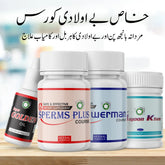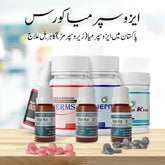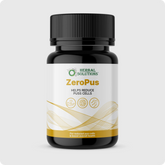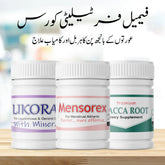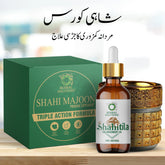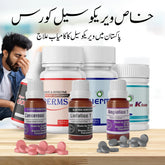Revitalizing Male Fertility: The Power of Herbal Solutions
The Hidden Epidemic of Male Fertility Issues
In recent years, male fertility has become an increasingly important topic in reproductive health discussions. Studies show that sperm counts have declined by more than 50% globally in the last four decades, yet many men remain unaware of the natural solutions available to them. This comprehensive guide explores how herbal solutions can effectively address male fertility challenges and restore reproductive health naturally.
When couples face conception difficulties, attention often turns immediately to female factors. However, research indicates that male factors contribute to approximately 40-50% of all infertility cases. The good news? Many of these issues can be addressed through targeted herbal interventions combined with lifestyle modifications.
Understanding Male Fertility Factors
Before exploring herbal remedies, it's essential to understand what determines male fertility:
- Sperm count - The concentration of sperm in semen (normal is 15+ million per milliliter)
- Sperm motility - The ability of sperm to swim efficiently toward an egg
- Sperm morphology - The size, shape, and structure of sperm
- Semen volume - The amount of ejaculate produced
- Hormonal balance - Proper levels of testosterone and other reproductive hormones
Multiple factors can disrupt these parameters, including:
- Environmental toxins - Pesticides, plastics, and industrial chemicals
- Lifestyle choices - Smoking, excessive alcohol, poor diet, lack of exercise
- Heat exposure - From tight clothing, laptops, hot tubs, or saunas
- Nutrient deficiencies - Lack of zinc, selenium, folate, and antioxidants
- Chronic stress - Elevated cortisol affecting hormone production
- Medical conditions - Varicocele, infections, or hormonal disorders
Top Herbs That Boost Male Fertility
Ashwagandha: The Stress-Fighting Fertility Enhancer
This powerful adaptogenic herb has been used in Ayurvedic medicine for centuries to boost male reproductive health. Modern research confirms its effectiveness:
- Improves sperm concentration - Clinical studies show increases of 167% in some cases
- Enhances sperm motility - Helping sperm swim more efficiently
- Increases semen volume - Supporting overall reproductive function
- Balances hormones - Particularly beneficial for testosterone levels
- Reduces oxidative stress - Protecting sperm DNA from damage
A landmark study published in the Journal of Evidence-Based Complementary & Alternative Medicine found that men taking ashwagandha for just three months experienced significant improvements across all semen parameters.
Shilajit: Nature's Mineral-Rich Fertility Boost
This unique substance formed from decomposed plant matter in the Himalayan mountains contains over 85 minerals and fulvic acid:
- Increases sperm count - Studies show improvements up to 60%
- Enhances sperm motility - Making conception more likely
- Improves testosterone levels - Supporting overall male reproductive health
- Provides vital minerals - Including zinc and selenium essential for sperm production
- Fights fatigue - Increasing energy and sexual stamina
Mucuna Pruriens: The Dopamine-Boosting Bean
Also known as velvet bean, this tropical legume contains L-DOPA, a precursor to dopamine that improves fertility through multiple mechanisms:
- Reduces stress - Lowering cortisol levels that can impair fertility
- Increases testosterone - Supporting healthy hormone balance
- Improves sperm quality - Enhancing count, motility, and morphology
- Provides antioxidant protection - Guarding against free radical damage
- Supports pleasure pathways - Potentially enhancing sexual satisfaction
A study in the Journal of Ethnopharmacology found that infertile men treated with Mucuna pruriens showed significant improvements in sperm quality and reductions in psychological stress.
Maca Root: The Andean Fertility Superfood
Native to the high Andes mountains of Peru, maca has been used for thousands of years to enhance fertility and sexual function:
- Increases sexual desire - Supporting more frequent conception attempts
- Improves sperm production - Both quantity and quality
- Supports erectile function - Essential for successful conception
- Provides rare nutrients - Including fertility-supporting glucosinolates
- Balances energy and mood - Supporting overall reproductive health
Unlike some herbs that directly alter hormone levels, maca works as an adaptogen that helps the body optimize its own hormone production naturally.
Tribulus Terrestris: The Hormone Harmonizer
This flowering plant has been used in both Chinese and Ayurvedic medicine for reproductive health:
- May raise testosterone levels - Particularly in men with lower baseline levels
- Enhances libido - Supporting sexual wellness and function
- Improves erectile quality - Critical for successful conception
- Supports sperm parameters - Multiple studies show improvements
- Contains saponins - Plant compounds that support hormone production
The Special Fertility Course: A Complete Solution
For men serious about addressing fertility challenges comprehensively, the Special Fertility Course offers a systematic approach combining multiple evidence-based herbal ingredients. This carefully formulated program provides:
- Synergistic herb combinations - Maximizing effectiveness through complementary actions
- Quality-controlled ingredients - Ensuring potency and purity
- Proper dosing protocols - Based on clinical research
- Targeted support - Addressing multiple aspects of male fertility simultaneously
Many users report significant improvements in sperm parameters after completing the full Special Fertility Course program, which combines traditional wisdom with modern scientific understanding.
The Science Behind Herbal Fertility Solutions
The effectiveness of herbal approaches to male fertility is increasingly supported by scientific research. Key mechanisms include:
Antioxidant Protection
Many herbs contain powerful antioxidants that protect sperm from oxidative damage:
- Flavonoids - Plant compounds that neutralize free radicals
- Vitamin C and E analogues - Protecting cell membranes
- Selenium compounds - Supporting glutathione production
- Polyphenols - Providing broad-spectrum protection
Learn more about antioxidants and fertility in our related article: How Free Radicals Damage Sperm and What to Do About It
Hormonal Optimization
Certain herbs help balance the hormonal environment for optimal fertility:
- Supporting testosterone production - The primary male reproductive hormone
- Modulating estrogen metabolism - Preventing hormonal imbalance
- Optimizing luteinizing hormone - Critical for testosterone production
- Supporting hypothalamic-pituitary-gonadal axis - The master control system for reproduction
Stress Reduction
Chronic stress significantly impairs male fertility, and adaptogenic herbs help counteract these effects:
- Lowering cortisol levels - The primary stress hormone
- Supporting adrenal function - Critical for hormone production
- Improving sleep quality - Essential for testosterone production
- Enhancing resilience - Helping manage everyday stressors
For more on this topic, see our in-depth guide: Stress and Male Fertility: Breaking the Cycle
Improved Blood Flow
Enhanced circulation to the reproductive organs supports optimal function:
- Dilating blood vessels - Improving delivery of nutrients
- Supporting nitric oxide production - Essential for erectile function
- Reducing inflammation - Enhancing overall vascular health
- Supporting heart health - The foundation of reproductive wellness
Lifestyle Factors That Enhance Herbal Solutions
While herbs can provide powerful support for male fertility, their effectiveness is maximized when combined with targeted lifestyle modifications:
Nutrition for Optimal Sperm Production
- Zinc-rich foods - Oysters, pumpkin seeds, grass-fed beef
- Omega-3 sources - Wild-caught fish, walnuts, flaxseeds
- Antioxidant-packed produce - Berries, pomegranates, dark leafy greens
- Clean protein - Essential for hormone production and sperm development
- Hydration - Supporting optimal semen volume and consistency
A Harvard School of Public Health study found that men who followed a Mediterranean-style diet had significantly better sperm parameters than those following typical Western diets.
Physical Activity for Reproductive Health
- Moderate regular exercise - 3-5 times weekly for 30-45 minutes
- Strength training - Supporting healthy testosterone levels
- Avoid excessive endurance training - Which can temporarily lower testosterone
- Include recovery days - Allowing hormonal systems to rebalance
Environmental Toxin Reduction
- Choose organic foods when possible - Reducing pesticide exposure
- Filter drinking water - Removing endocrine-disrupting chemicals
- Use natural personal care products - Avoiding phthalates and parabens
- Minimize plastic use - Particularly for food storage and heating
Thermal Optimization
Keeping the testicles at the proper temperature (slightly below body temperature) is crucial:
- Wear loose-fitting underwear - Supporting proper temperature regulation
- Avoid prolonged hot baths and saunas - Which can temporarily impair sperm production
- Keep laptops off the lap - Preventing direct heat exposure
- Take regular breaks from sitting - Improving circulation to reproductive organs
Creating Your Personalized Fertility Plan
Every man's fertility journey is unique. Consider these steps when developing your personalized approach:
- Assess your current situation - Consider getting a semen analysis if possible
- Identify contributing factors - Evaluate lifestyle, environmental, and health factors
- Set realistic timelines - Sperm production takes approximately 74 days
- Implement targeted interventions - Including appropriate herbal supports like the Special Fertility Course
- Track progress - Monitor improvements in energy, libido, and fertility markers
- Adjust as needed - Fine-tune your approach based on results
When to Combine Herbal and Conventional Approaches
While herbal solutions can be remarkably effective, certain situations warrant medical attention:
- No improvement after 6-12 months of natural approaches
- Known medical conditions affecting fertility (varicocele, hormonal disorders)
- Female partner over 35 (time may be more critical)
- Completely absent sperm in ejaculate (azoospermia)
- Sudden onset of fertility issues
Many couples find that integrative approaches—combining the best of natural and conventional medicine—offer the most comprehensive support.
Success Stories: Herbal Solutions in Action
Many men have experienced significant improvements using herbal approaches to fertility:
"After trying for two years with no success, I discovered the power of herbal solutions for male fertility. Three months after starting a comprehensive herbal program, my sperm count increased by over 200%, and we conceived naturally the following month." - Michael, 34
"My doctor told me my sperm motility was only 25% and suggested we consider assisted reproduction. After completing the Special Fertility Course and making lifestyle changes, my motility increased to 65%, and we're now expecting our first child." - David, 41
Conclusion: Empowering Your Fertility Journey
Taking control of your reproductive health through evidence-based herbal solutions represents a powerful path forward for many men facing fertility challenges. The combination of traditional wisdom and modern scientific validation offers hope and practical solutions where conventional approaches may be limited.
Remember that improvements in sperm health take time—typically 2-3 months for a complete sperm regeneration cycle. Patience, consistency, and a comprehensive approach that addresses multiple aspects of fertility simultaneously typically yield the best results.
If you're ready to take proactive steps toward optimizing your fertility naturally, consider exploring the systematic approach offered by the Special Fertility Course, which has helped countless men reclaim their reproductive health and fulfill their dreams of fatherhood.
What steps will you take today to support your reproductive health naturally?
